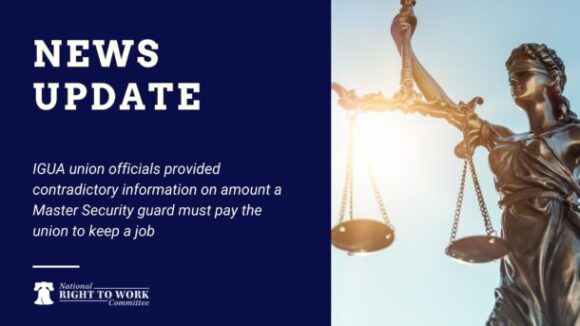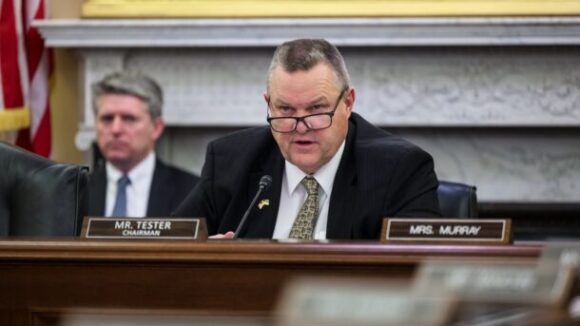GOP’s ‘Dangerous Liaison’ With Union Bigwigs
Josh Hawley distances himself from pro-Right to Work pledges, aligning with union bosses like the Teamsters, despite their history of corruption.
Kimberly Strassel makes the point — as payback for big labor union support, the Obama administration greases the wheels for the largest federal organizing effort in history:
Wisconsin Gov. Scott Walker made some progress this week in rescuing his state from the public-sector unions holding it hostage. Ever wonder how Wisconsin got into trouble in the first place? Washington is providing an illuminating case study.
Even as state battles rage, the Obama administration has been facilitating the largest federal union organizing effort in history. Tens of thousands of Transportation Security Administration (TSA) screeners are now casting votes to choose a union to collectively bargain for cushier personnel practices on their behalf.
Liberals are calling it a “historic” vote. It is. Henceforth, airport security will play second fiddle to screener “rights.”
Here’s the fundamental problem with public-employee unions: They exist to compete with, and undermine, public priorities. The priority of Wisconsin citizens is a state that can provide basic services, encourage private-sector jobs, and pay its bills. Wisconsin public-employee unions, by contrast, were formed to, and exist to, erect a system that showers members with plump pay and benefits, crowding out state services and private jobs. The same disconnect is on display with the TSA.
On Sept. 11, 2001, more than 3,000 Americans died after terrorists turned airplanes into missiles. It was a colossal security failure. Congress responded by creating the TSA. The merits of federalizing airport screening were always questionable, though at least the public priority was clear.
Back then, a bipartisan majority of Congress agreed that a crack airport security service was incompatible with rigid unionization rules. Yet by 2008, Democratic presidential candidates were betting that security worries had receded enough that they could again pander for union votes. Candidate Barack Obama sent a letter to American Federation of Government Employees boss John Gage, vowing that his “priority” was giving Transportation Security Officers (TSOs) “collective bargaining rights and workplace protections.”
That’s been the administration’s “priority,” even as the public grows more disillusioned with a failing agency. The White House was forced to withdraw its first two picks for TSA administrator—Earl Southers and Robert Harding—after complaints that they’d been chosen more for their willingness to play union ball than for security expertise. John Pistole, who got the job in mid-2010, has earned praise even from Republicans—although everyone understood the administration expected him to also concede on TSA bargaining.
And, surprise, after a pro-forma “assessment” of the implications, Mr. Pistole last month gave the green light for this week’s vote. Or, as South Carolina Sen. Jim DeMint says, President Obama is finally making good on a “political kickback to the union bosses who poured money into his campaign in 2010 and who he desperately needs to win re-election in 2012.” Whatever union is now chosen to bargain for TSA workers—either Mr. Gage’s American Federation of Government Employees, or the National Treasury Employees Union—will have the power to begin transforming the agency into one that puts union priorities first, security second.
Mr. Pistole is insisting that he won’t bargain over security policies, pay and benefits, qualifications or disciplinary measures. But some of this is fuzzy, and there’s plenty for the union to be getting on with, including union rules on shifts, hours and transfers. This will stymie or delay the TSA’s ability to quickly move workers to heightened security risks, to institute new procedures, or to keep terrorists guessing. Aviation experts like Michael Boyd of Boyd International have warned the TSA is already a “60,000 member DMV from Hell.”
Mr. Gage, meanwhile, in a pitch video designed to get screeners to choose his union, let it be known that no issue would be too trivial for the AFGE to bargain over, including “leave restriction, parking subsidies, uniforms—all the frustrations that TSOs have had to endure.” He also assured screeners that an army of attorneys is standing by on their behalf: “more attorneys than any union, federal or private.”
This is how you end up with the Customs and Border Protection Agency, whose union is allowed to collectively bargain personnel issues. In recent years, the agency has spent months negotiating with its union over how and whether it can discipline employees who fall asleep on the job, and over how much training it can give officers who fail a firearm test.
The administration is already doing the bidding of the eventual TSA union by making it harder for airports to escape the coming system. House Transportation Committee Chairman John Mica is investigating the agency’s recent decision to raise the bar in allowing airports to opt for private screeners, and its recent denial of that request by five airports.
The TSA is allowing Americans to witness the downward spiral of the collective-bargaining system in action. Government sets out to accomplish specific public priorities. Unions, via dues, elect politicians who will agree to collective bargaining, and to shift those priorities to those of the union. The fights in Wisconsin and elsewhere are about the public trying to reassert its will.

Josh Hawley distances himself from pro-Right to Work pledges, aligning with union bosses like the Teamsters, despite their history of corruption.

IGUA union officials provided contradictory information on amount a Master Security guard must pay the union to keep a job

Thanks to the Committee's election-year program, union-label candidates like Sen. Jon Tester (Mont.) are being given a choice: pledge to change course and support Right to Work going forward, or face the potential political consequences.